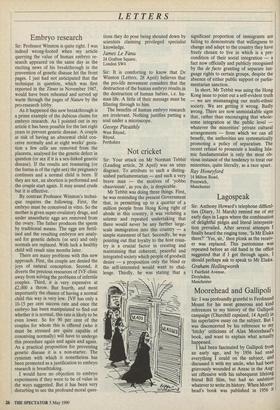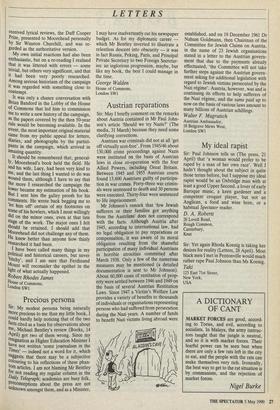Moorehead and Gallipoli
Sir: I was profoundly grateful to Ferdinand Mount for his most generous and kind references to my history of the Gallipoli campaign (Churchill capsized, 14 April) in his superlative essay on the subject. But was disconcerted by his reference to my `bitchy' criticisms of Alan Moorehead's book, and want to explain what actually happened.
I had been fascinated by Gallipoli from an early age, and by 1956 had read everything I could on the subject, and discussed it with my uncle, who had been grievously wounded at Anzac in the Aug- ust offensive with his subsequent lifelong friend Bill Slim, but had no ambition whatever to write its history. When Moore- head's book was published in 1956 it
LETTERS
received lyrical reviews, the Duff Cooper Prize, presented to Moorehead personally by Sir Winston Churchill, and was re- garded as the authoritative version.
My own initial reactions had also been enthusiastic, but on a re-reading I realised that it was littered with errors — some trivial, but others very significant, and that It had been very poorly researched. Among serious historians of the campaign It was regarded with something close to contempt.
It was only a chance conversation with Brian Batsford in the Lobby of the House of Commons that led him to commission me to write a new history of the campaign, as the papers covered by the then 50-year rule would be becoming available. In the event, the most important original material came from my public appeal for letters, diaries, and photographs by the partici- pants in the campaign, which arrived in amazing quantity. It should be remembered that, general- ly, Moorehead's book held the field. He and his wife, Lucy, had been very kind to me, and the last thing I wanted to do was wound them, although I have to say that the more I researched the campaign the lower became my estimation of his book. But I sent him the galley proofs for his Comments. He wrote back begging me to let him off' certain of my footnotes on some of his howlers, which I most willingly did on the minor ones, even at that late stage of the work. The major ones I felt should be retained. I should add that Moorehead did not challenge any of them. He knew better than anyone how thinly researched it had been.
I have been called many things in my Political and historical careers, but never `bitchy', and I am sure that Ferdinand Mount will reconsider the epithet in the light of what actually happened.
Robert Rhodes James
House of Commons, London SW1



















































 Previous page
Previous page